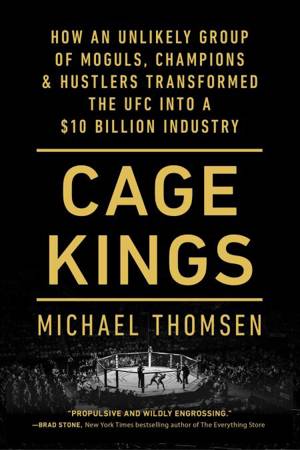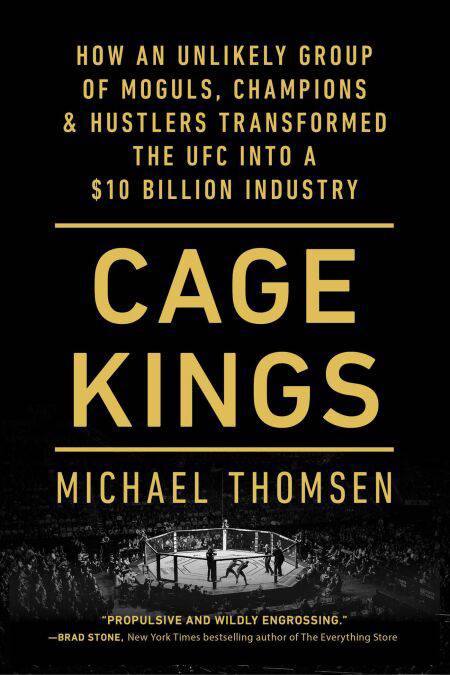
- Retrait gratuit dans votre magasin Club
- 7.000.000 titres dans notre catalogue
- Payer en toute sécurité
- Toujours un magasin près de chez vous
- Retrait gratuit dans votre magasin Club
- 7.000.0000 titres dans notre catalogue
- Payer en toute sécurité
- Toujours un magasin près de chez vous
Cage Kings EBOOK
How an Unlikely Group of Moguls, Champions & Hustlers Transformed the UFC into a $10 Billion Industry
Michael Thomsen
Ebook | Anglais
17,88 €
+ 17 points
Description
A “propulsive and wildly engrossing” (Brad Stone, author of The Everything Store) account of how the UFC turned mixed martial arts into a multibillion-dollar business and global pop culture phenomenon.
Decried as “human cockfighting” by Senator John McCain and dismissed by the New York Times as a “pay-per-view prism” onto the decline of Western civilization, the UFC seemed by 2000 to be bleeding out. The cage fighting promotion had been banned in thirty-six states and was struggling to cover production costs for its next event.
But three buddies in Las Vegas—an ambitious personal trainer and two young casino heirs—saw something else in the UFC: a vision of the future. Over the next two decades, the trio would transform the company into one of the most valuable sports properties in the world, worth more than the Beatles catalog or the New York Yankees. And along the way, they would also transform the lives of some of the sport’s biggest stars, both for better and worse.
A “captivating” (Christopher Leonard, author of The Lords of Easy Money) behind-the-scenes account of a once-reviled subculture’s strange path to pop legitimacy, Cage Kings embeds you in a world of desperate fighters, audacious promoters, fanboy bloggers, fatherly trainers, philosophical announcers, hustling sponsors, and three improbable twentysomething corporate titans on a darkly comic odyssey to normalize a new level of brutality in American pop culture—and make a fortune doing so. For in an era of generational poverty, eroding labor rights, radical media transformations, simmering political grievances, and an obsession with winning at any cost, the spectacle of two people fighting in a cage for another few months’ wages suddenly seemed to make sense.
Stylishly written and poignantly observed, this “must-read for fans and the simply curious alike” (Matthew Polly, author of American Shaolin) offers a provocative look at how the hollowing out of the American dream and the violence of modern capitalism left us ready to embrace a sport like cage fighting.
Decried as “human cockfighting” by Senator John McCain and dismissed by the New York Times as a “pay-per-view prism” onto the decline of Western civilization, the UFC seemed by 2000 to be bleeding out. The cage fighting promotion had been banned in thirty-six states and was struggling to cover production costs for its next event.
But three buddies in Las Vegas—an ambitious personal trainer and two young casino heirs—saw something else in the UFC: a vision of the future. Over the next two decades, the trio would transform the company into one of the most valuable sports properties in the world, worth more than the Beatles catalog or the New York Yankees. And along the way, they would also transform the lives of some of the sport’s biggest stars, both for better and worse.
A “captivating” (Christopher Leonard, author of The Lords of Easy Money) behind-the-scenes account of a once-reviled subculture’s strange path to pop legitimacy, Cage Kings embeds you in a world of desperate fighters, audacious promoters, fanboy bloggers, fatherly trainers, philosophical announcers, hustling sponsors, and three improbable twentysomething corporate titans on a darkly comic odyssey to normalize a new level of brutality in American pop culture—and make a fortune doing so. For in an era of generational poverty, eroding labor rights, radical media transformations, simmering political grievances, and an obsession with winning at any cost, the spectacle of two people fighting in a cage for another few months’ wages suddenly seemed to make sense.
Stylishly written and poignantly observed, this “must-read for fans and the simply curious alike” (Matthew Polly, author of American Shaolin) offers a provocative look at how the hollowing out of the American dream and the violence of modern capitalism left us ready to embrace a sport like cage fighting.
Spécifications
Parties prenantes
- Auteur(s) :
- Editeur:
Contenu
- Nombre de pages :
- 448
- Langue:
- Anglais
Caractéristiques
- EAN:
- 9781501198533
- Date de parution :
- 19-06-23
- Format:
- Ebook
- Protection digitale:
- Adobe DRM
- Format numérique:
- ePub

Les avis
Nous publions uniquement les avis qui respectent les conditions requises. Consultez nos conditions pour les avis.






